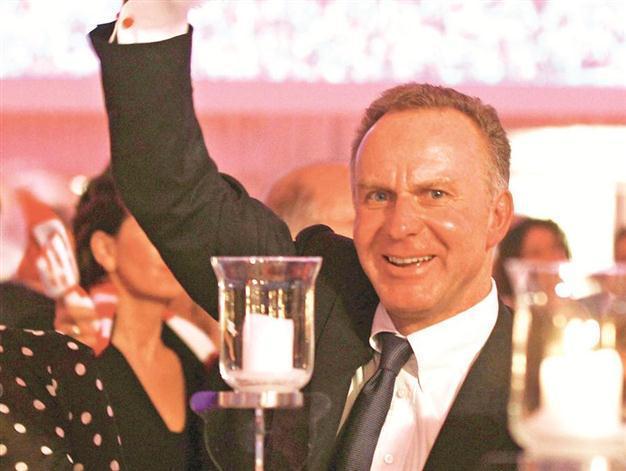Clubs, UEFA agree to reduce friendlies
WARSAW - Reuters

Bayern Munich Chief Executive Karl-Heinz Rummenigge waves with a football scarf during the 60th birthday celebrations of Bayern Munich President Uli Hoeness. REUTERS photo
Europe’s leading football clubs hailed a “major breakthrough” yesterday after agreeing with UEFA to drop the unpopular August date for international friendlies.
European Clubs Association (ECA) chairman Karl-Heinz Rummenigge, in an address to the body’s general assembly in Warsaw, said an agreement had been reached with the European governing body over scrapping the date.
However the German warned that world body FIFA had yet to sanction the move. FIFA itself said it was surprised by recent developments, saying the association had hindered progress on the international calendar because its members had declined to attend FIFA committee meetings.
ECA said that it and UEFA had agreed that the international calendar would be made up of nine double-headers covering a two-year period, with no single friendlies.
In a new Memorandum of Understanding between UEFA and the clubs, they agreed that the two matches of the double date for friendlies should be played on the same continent. The final tournaments of all confederations would end in July, and players would not be expected to play in more than one international tournament a year.
The ECA, comprising Europe’s top 201 clubs, also reached agreement over insurance payments for players injured while on international duty. It agreed an increase in benefits from UEFA for clubs whose players were involved in Euro 2012, with the increases to be announced at the UEFA Congress in Istanbul next month.
With so many more African players now with European clubs, it was agreed that the Africa Cup of Nations should start as early as possible in January, when it was staged.
Rummenigge said the agreement was “a major break-through for European club football”.
“With this agreement, UEFA clearly recognises the importance of clubs and the significant contribution they make to the success of national team football,” he added.
“The negotiations have not always proved easy, but were always conducted in a fair and respectful manner.
“I sincerely thank UEFA, in particular UEFA President (Michel) Platini, on behalf of all European clubs and look forward to our continued cooperation. This is once more a proof that in the European football family solutions can be found in a cooperative and fair way.”
